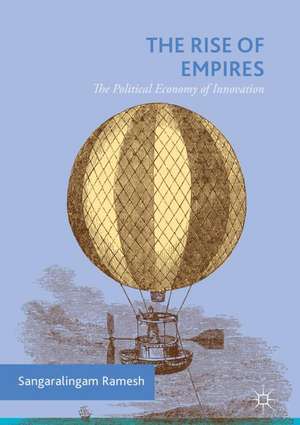The Rise of Empires: The Political Economy of Innovation
Autor Sangaralingam Rameshen Limba Engleză Hardback – 19 noi 2018
This book describes and evaluates how institutional innovation and technological innovation have impacted on humanity from pre-historical times to modern times, and how societies have been transformed in history. The author interrogates the relationship between innovation and civilisation -– particularly the dynamic whereby innovation leads to empire-building -– and explores innovation efforts that stimulated economic and social synergies from the Babylonian Empire in 1900 BC up to the British Empire in the twentieth century. The author uses historical cross-cultural case studies to establish the factors which have given competitive advantages to societies and empires.
This book will be of interest to researchers and students in political economy, economic history, economic growth and innovation economics.
| Toate formatele și edițiile | Preț | Express |
|---|---|---|
| Paperback (1) | 726.55 lei 43-57 zile | |
| Springer International Publishing – 18 feb 2020 | 726.55 lei 43-57 zile | |
| Hardback (1) | 731.73 lei 43-57 zile | |
| Springer International Publishing – 19 noi 2018 | 731.73 lei 43-57 zile |
Preț: 731.73 lei
Preț vechi: 892.35 lei
-18% Nou
Puncte Express: 1098
Preț estimativ în valută:
140.01€ • 146.58$ • 115.85£
140.01€ • 146.58$ • 115.85£
Carte tipărită la comandă
Livrare economică 07-21 aprilie
Preluare comenzi: 021 569.72.76
Specificații
ISBN-13: 9783030016074
ISBN-10: 3030016072
Pagini: 264
Ilustrații: XIV, 328 p. 1 illus.
Dimensiuni: 148 x 210 mm
Greutate: 0.56 kg
Ediția:1st ed. 2018
Editura: Springer International Publishing
Colecția Palgrave Macmillan
Locul publicării:Cham, Switzerland
ISBN-10: 3030016072
Pagini: 264
Ilustrații: XIV, 328 p. 1 illus.
Dimensiuni: 148 x 210 mm
Greutate: 0.56 kg
Ediția:1st ed. 2018
Editura: Springer International Publishing
Colecția Palgrave Macmillan
Locul publicării:Cham, Switzerland
Cuprins
1. Introduction.- 2. Theory of Innovation and Causal Dynamics.- 3. Pre-History – Emergence & Palaeolithic to Bronze Age (10,000BC to 800BC).- 4. The Babylonian Empire (1900BC to 539BC).- 5. Ancient Greece (1100BC to 30BC).- 6. The Roman Empire (443BC to 395AD).- 7. The Chola Dynasty (350BC to 1279AD).- 8. The Han Dynasty (206BC – 220AD) and The Song Dynasty (960AD to 1279AD).- 9. The Mongol Empire (1206AD to 1368AD).- 10. The British Empire (1603AD to 1997AD).- 11. Conclusion.
Notă biografică
Dr Sangaralingam Ramesh is Economics Tutor in the Department of Continuing Education at the University of Oxford, and a Teaching Fellow in Economics at University College London. He has been an Associate Professor in Economics at the Université Paris Dauphine GBD, France and Economics Module Leader at Kings College London, University of London, UK. He has published articles in the International Journal of Economic Sciences and Applied Research, the Journal of the Knowledge Economy and the Journal of Economics and Sustainable Development. Most recently he published China's Lessons for India, Volumes I & II (Palgrave Macmillan, 2017).
Textul de pe ultima copertă
This book describes and evaluates how institutional innovation and technological innovation have impacted on humanity from pre-historical times to modern times, and how societies have been transformed in history. The author interrogates the relationship between innovation and civilisation -– particularly the dynamic whereby innovation leads to empire-building -– and explores innovation efforts that stimulated economic and social synergies from the Babylonian Empire in 1900 BC up to the British Empire in the twentieth century. The author uses historical cross-cultural case studies to establish the factors which have given competitive advantages to societies and empires.
This book will be of interest to researchers and students in political economy, economic history, economic growth and innovation economics.
Caracteristici
Explores the nexus of empires with a contemporary interest in innovation Evaluates the relevance of traditional economic theory Uses a cross-cultural approach to explore the economic and social progress of civilisations
